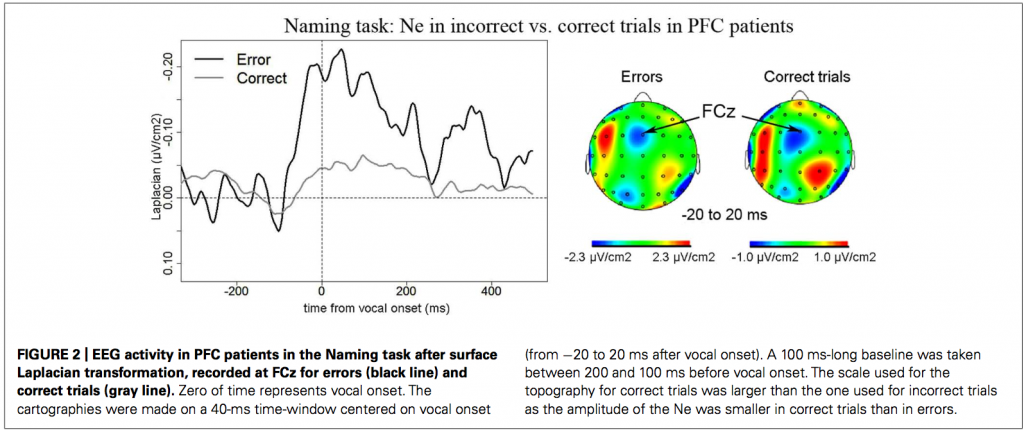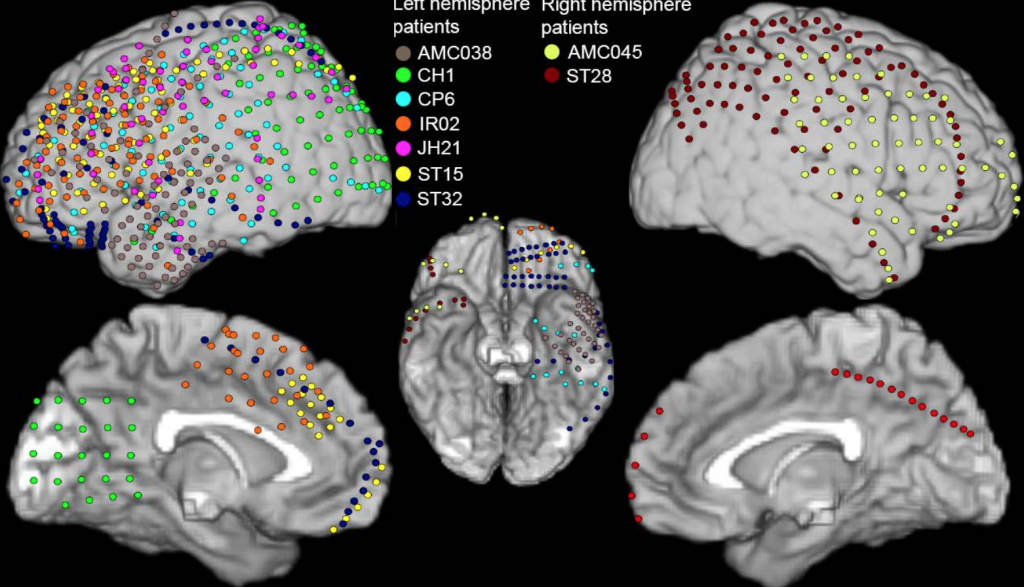Our research program is centered around better understanding our ability to retrieve words from memory as we speak and try to avoid making speech errors. These processes are highly efficient in healthy speakers as adults can fluidly utter 2 to 3 words per second retrieved from over 50,000 regularly-used words in memory and only err once every 1000 words produced (Levelt, Roelofs, & Meyer, 1999). However, individuals who have survived neural trauma (e.g., stroke) and have a resulting language impairment (i.e., aphasia), do not have such an easy time retrieving words during language production and make more errors. Word finding difficulties and increased speech errors are observed to varying extents in all patients with aphasia as well as in neurodegenerative diseases and normal aging. Despite the immense personal and societal cost caused by the disruption of these processes, their neural basis and that of the compensatory mechanisms involved are poorly understood. Shedding light on the physiology of these mechanisms is a key step toward translational approaches promoting recovery from stroke-induced aphasia.
Our research therefore aims to shed light on:
- The brain dynamics of word retrieval and speech monitoring.
- The nature of the control mechanisms involved.
- The effect of stroke-induced brain damage on brain networks involved in word retrieval and speech monitoring.
1: Brain dynamics of language production
The aim is to characterize which brain regions are involved in word retrieval and when, if, and how these regions interact with each other to allow word retrieval to take place.
We record scalp electroencephalography data in our lab to study the brain dynamics of language production.

We record intracranial electroencephalography data from patients undergoing monitoring for intractable epilepsy in order to gain a deeper insight into these brain dynamics. This technique offers an invaluable opportunity to obtain both spatial and temporal information about how the brain supports word retrieval.

Cited in news article http://newscenter.sdsu.edu/sdsu_newscenter/news_story.aspx?sid=76798
2: Control mechanisms involved in language production
Retrieving words when we speak requires paying attention (i.e., cognitive control) but the nature of the control mechanisms involved is poorly understood. Our work has shown that the processes involved in making sure we do not produce errors when we speak are at least partly shared between language and other actions (Ries, Janssen, Dufau, Alario, & Burle, 2011), and has helped specify the nature of the linguistic representations involved (Ries, Fraser, McMahon, & de Zubicaray, 2015).
Current investigations include:
- the study of these cognitive control processes in bilinguals
- the investigation of speech monitoring across modalities (oral versus sign language), in collaboration with Dr Emmorey, Dr Holcomb and Dr Midgley’s labs at SDSU
In addition, our work is specifying the nature of proactive control processes involved in word retrieval and whether those are shared with other functions (Ries, Greenhouse, Dronkers, Haaland, & Knight, 2014), (Ries, Schendel, Dronkers, & Turken, 2014).
3: Effect of stroke-induced brain damage on brain networks involved in language production
Stroke survivors may have language deficits caused by lesions almost anywhere within the left hemisphere. The nature of these deficits can vary depending on the affected brain regions and subcortical pathways but the exact roles of these regions and pathways is still unclear. Our work has shed light on the role of the left prefrontal cortex in word retrieval and speech monitoring. (Piai, Ries, & Swick, 2016) , (Ries, Karzmark, Navarrete, Knight, & Dronkers, 2015) ,(Ries, Greenhouse, Dronkers, Haaland, & Knight, 2014) , (Ries, Xie, Haaland, Dronkers, & Knight, 2013).
In collaboration with Dr Anders, Dr van Maanen, and Dr Alario (Marseille, France), we have started investigating word retrieval in terms of an evidence accumulation process (Anders, Ries, Van Maanen, & Alario, 2015). We have recently published a study showing that lesions to the left prefrontal cortex leads to an impairment in decision threshold adjustment in picture naming (Anders, Ries, Van Maanen, & Alario 2017).
Current investigations are focused on:
- the role of the left posterior temporal cortex in word retrieval and speech monitoring
- the nature of compensatory mechanisms involved in word retrieval after left hemisphere lesions (Ries, Dronkers, & Knight, 2016)
